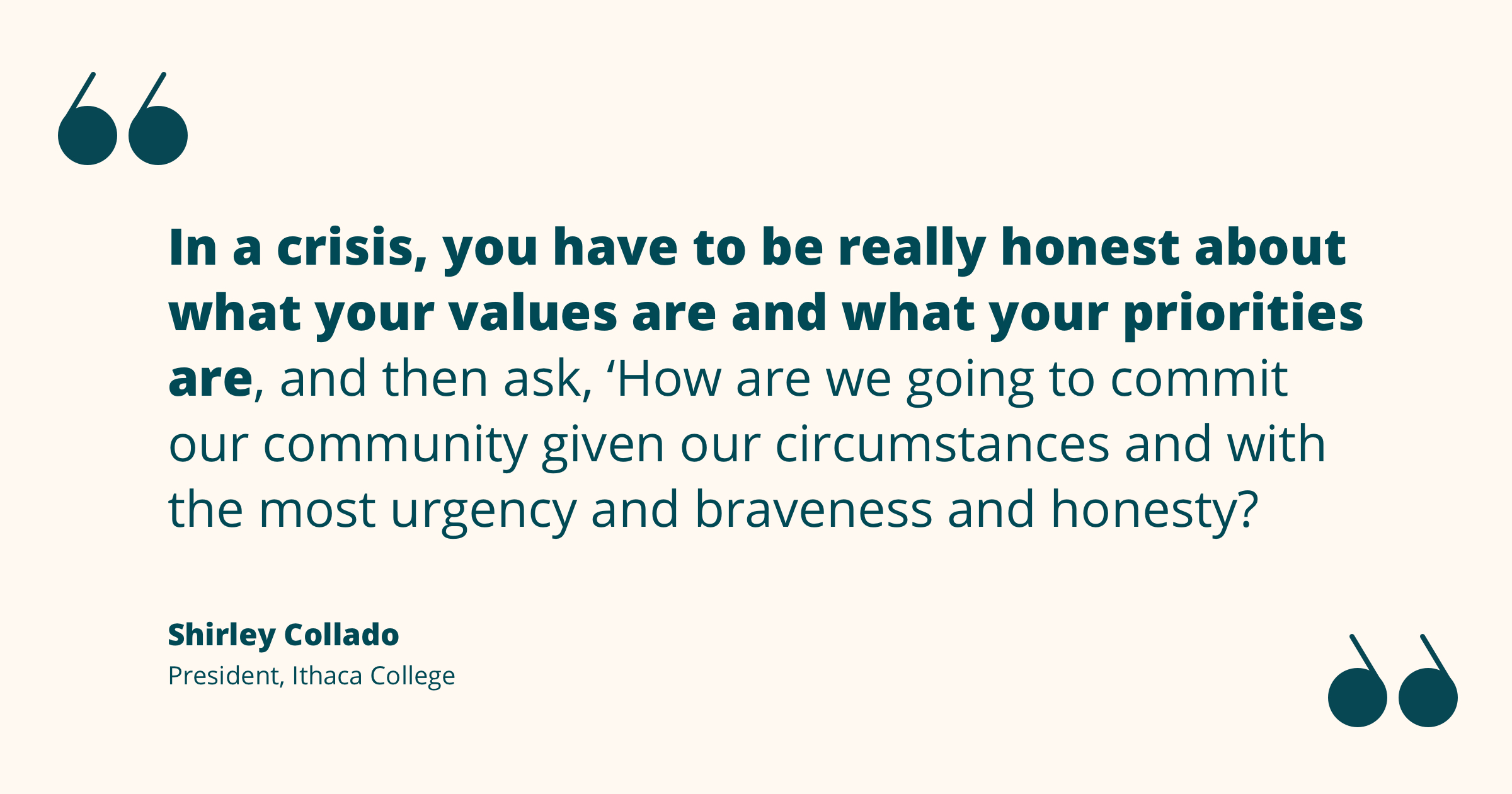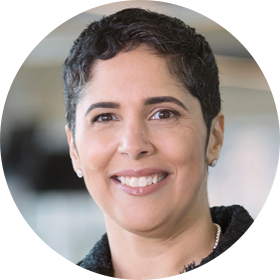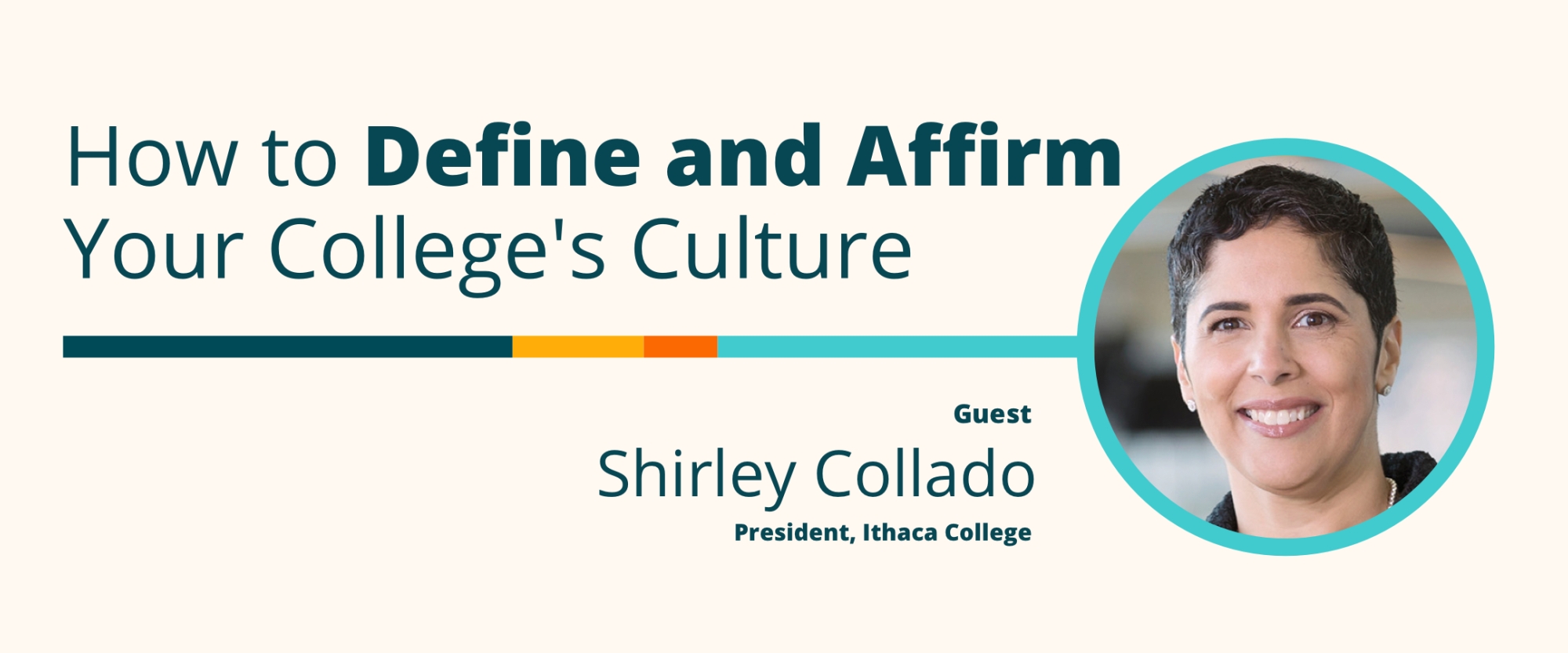Note: This interview, Episode 6 of the Weekly Wisdom Series, originally aired on May 18, 2020 as part of the University Innovation Alliance’s Innovating Together podcast, appearing live on Facebook, Twitter, and LinkedIn.
The Innovating Together podcast is created through a partnership of the University Innovation Alliance (UIA) and Inside Higher Ed. I'm UIA's Executive Director, and my co-host for this podcast is Jeff Selingo, author, journalist, and special advisor at Arizona State University. In Episode 6 of Innovating Together's Weekly Wisdom series, we had an inspiring conversation with Dr. Shirley Collado of Ithaca College. President Collado is engaged in an act of what she calls "bold realism," which is nothing less than forging ahead with her institution's visionary new strategic plan amidst the drastic pivot that the COVID-19 pandemic has demanded from all college presidents. Her history of reorganization initiatives passion for serving all students lend her wisdom a stirring positivity.
A Moment for Embracing Change
When we spoke with President Collado, she had just announced her administration's intent to restart Ithaca College's in-person education in early October. "I'm carrying the weight of enormous decisions that need to be carried out in a collaborative way, for the public good, in a market that’s completely shifting," she told us. She characterized the reopening as a product of data-driven, science-based, and methodical yet nimble decision making. She added, "We really thought that starting in October would give us a runway that would allow our faculty and staff to be innovative, to follow a carefully-planned-out emergency health safety management plan that would be in line with the state. And for families who are thinking about their child returning to college or going to college for the first time that they know they’re coming to a place that’s really thought this through."
She explained that the decision to reopen in pandemic-wracked New York State "comes on the heels of us putting together some pretty amazing and innovative summer programs, all virtual, courses and virtual engagement strategies for returning and new students, to really promote student success, yield and retention, which is a big part of our strategic plan, Ithaca Forever." Essentially, President Collado saw the crisis as an opportunity. "We already knew that we needed to embrace some huge structural changes," she said, "so in some bizarre way this crisis allowed for some light to be shed rather radically to activate change that perhaps for us was going to take three to four years."
"In a crisis, you have to be really honest about what your values are and what your real priorities are," she told us. "And so in some ways, as a leader, it’s given me the opportunity to really commit our community to what we said we were going to do, and then ask how are we going to do it given our circumstances and with the most sense of urgency and braveness and honesty?"

Defining and Affirming Ithaca College's Culture
President Collado believes that launching the Ithaca Forever initiative at this time aligns with her personal philosophy of servant leadership. "This simply ended up being an incredible position to really live out the kind of change that I believe students need to see in American higher education," she said. "A big part of our plan is recalibrating our size, aligning what we’re delivering with the size that makes sense in the market, that’s intentional, that’s strategic and will inevitably call for some very difficult decisions around academic program prioritization, around curricular development that’s relevant for students." These decisions, however, while reflecting the practical realities of the Northeast's saturated higher ed market, must also respect the existing framework of a just, equitable, affordable institution where all students thrive and where faculty and staff want to work. "And, boy, has this crisis really moved us to produce the most honest version of who we are, what our culture's really about," she told us.
Describing her challenge, President Collado explained, "If you are truly focused on the development of students and making sure that they have a chance at this incredible privilege of being educated, then all of your decisions really should be guided by that. And sometimes when we’re making decisions in higher ed, I think presidents have so many constituents that they have to navigate and manage and control messages on that we can sometimes lose ourselves in that. It’s actually pretty hard to be brave, and very honest and vulnerable and take chances and try something and fail at it," she admitted. "We ask students to do this all the time. And so one of the great outcomes of this crisis is enormous shifts that we would’ve never anticipated being willing to do. And it was the grit and the tenacity and the will of this place focused on students that made people stretch into areas that they were not comfortable going into."
Highlighting Ithaca College's history as a source of guidance, President Collado told us, "I inherited an institution that in 1892 as a conservatory of music already had in its D.N.A. this kind of grit, this appetite, this scrappiness, this brave way to reimagine music education and then throw itself into complete liberal arts and the power of professional education. When you go back to the roots of the place, you can connect it to contemporary reality and say, 'Why were we here in the first place? What have we been trying to do?' And so part of my balancing hope with reality, which in our plan I called 'bold realism,' it’s really about getting people to understand that change is inevitable."
Positive Changes Already in Play
As the COVID-19 crisis forces changes in how colleges operate, President Collado hopes that some of Ithaca's changes will be permanent. "We have some incredible faculty who are very innovative in the space of virtual work and the use of technology," she said. "And they have been out, front and center, really helping their peers figure out a best way to do things that would normally feel scary and not make sense. I think the level of collaboration that’s happening across higher ed is creating a space for people to work together in ways that they haven’t before. I think that's allowed us to uncover redundancies and inefficiencies and raise up things that are really empowering and creative."
President Collado also sees a curriculum change that will support the Ithaca Forever strategic plan. "Our summer initiatives are a great example," she told us. "We’re offering very low-cost courses for returning students so that they don't miss a beat, and for new students coming in. And we have many faculty proposals for interdisciplinary courses focused on retention and success. And so that creativity of course development and working alongside staff in student affairs, that's the kind of intersection you don't really see easily and swiftly in the academy. We're saying, 'Yeah, let’s deliver a curriculum that’s relevant to today’s society and also affordable and engaging,' and having students feel during this horrible time for them, especially high school students, that they have something to go to and that they can be connected in ways that perhaps before getting on a residential college campus they didn’t and we didn’t imagine possible."
Keeping It Light
Music, dance, and poetry lift President Collado's spirits. "A dance break on a daily basis doesn’t hurt anybody," she remarked. Before social distancing, she even appeared in a dance video by I.C. students. "It’s really fun and it keeps me alive, you know?" she said. "You can't go wrong with some great Billie Holiday. And my husband Van and I actually introduced quite a bit of jazz to events, including commencement my last two years here. I'm married to a poet and we read together," she went on. "When reading all of this heavy higher ed writing, you need a creative space. Right now I'm reading Afterlife by Julia Alvarez. It’s a work of fiction and a really beautiful book. And I read some graphic novels as well." She welcomes students approaching her with arts-related projects, adding, "In open office hours, I participate in all kinds of things that students will come in and ask if I'm willing to be a part of. So we have a creative bunch here at Ithaca College."
Links Mentioned in This Episode
• Ithaca College
• Ithaca Forever (college's five-year strategic plan)
• Afterlife
Bios of Guest and Co-Hosts

Guest: Shirley Collado, President, Ithaca College
Dr. Shirley M. Collado is the ninth president of Ithaca College, serving since 2017. She is nationally recognized for designing and implementing innovative approaches to higher education that expand student access and success, and has extensive experience overseeing complex not-for-profit organizations in both the private and public sectors of higher education. In her first year at I.C., she launched two innovative efforts to facilitate cross-disciplinary collaboration and develop the talent of faculty, staff, and students: the President’s Seed Grant Initiative and the President’s Fellows Program. Under her direction, the Ithaca College community launched a strategic planning process in the 2018-19 academic year, focused on creating a foundational blueprint for the college's future as a diverse, inclusive, and equitable learning community. Prior to joining Ithaca, President Collado served at Rutgers University-Newark as executive vice chancellor and chief operating officer; at Middlebury College as vice president for student affairs and college dean; and at the Posse Foundation as executive vice president. She has excelled at securing support from national foundations focused on innovative and cross-institutional initiatives. She earned her undergraduate degree in human and organizational development and psychology from Vanderbilt University (where she currently sits on the Board of Trust), and M.A. and Ph.D. degrees in clinical psychology from Duke University. She is a clinical psychologist with a specialty in trauma among multicultural populations at the intersection of race, ethnicity, and gender. Along with Angela Batista and David Perez II, she co-edited the book Latinx/a/os in Higher Education: Exploring Identity, Pathways, and Success, released in early 2018. President Collado is the Brooklyn-born daughter of Dominican immigrants, a member of Posse’s inaugural class, and the first college graduate in her family. She is married to the award-winning poet A. Van Jordan, who holds an appointment as distinguished visiting professor at Ithaca College.

Co-Host: Bridget Burns, Executive Director, University Innovation Alliance
Dr. Bridget Burns is the founding Executive Director of the University Innovation Alliance (UIA). For the past decade, she has advised university presidents, system chancellors, and state and federal policy leaders on strategies to expand access to higher education, address costs, and promote completion for students of all backgrounds. The UIA was developed during Bridget’s tenure as an American Council on Education (A.C.E.) Fellowship at Arizona State University. She held multiple roles within the Oregon University System, including serving as Chief of Staff and Senior Policy Advisor, where she won the national award for innovation in higher education government relations. She was a National Associate for the National Center for Public Policy and Higher Education, and has served on several statewide governing boards including ones governing higher education institutions, financial aid policy, and policy areas impacting children and families.

Co-Host: Jeff Selingo, author, journalist, special advisor at Arizona State University
Jeff Selingo is an author, a journalist, and a special advisor at Arizona State University. He has written about higher education for more than two decades and is a New York Times bestselling author of three books. His latest book, Who Gets In & Why: A Year Inside College Admissions, was published in September 2020 and was named an Editors’ Choice by the New York Times Book Review. A regular contributor to The Atlantic, Jeff is a special advisor for innovation and professor of practice at Arizona State University. He also co-hosts the podcast, FutureU. He lives in Washington, D.C. with his family.
About Weekly Wisdom
Weekly Wisdom is an event series that happens live on Facebook, Twitter, and LinkedIn. It also becomes a podcast episode. Every week, we join forces with Inside Higher Ed and talk with a sitting college president or chancellor about how they're specifically navigating the challenges of this moment. These conversations will be filled with practicable things you can do right now by unpacking how and why college leaders are making decisions within higher education. Hopefully, these episodes will also leave you with a sense of optimism and a bit of inspiration.
Rate, Review & Subscribe
Learn why hundreds of people have rated this new podcast 5 stars! Please join others and rate and review this podcast. This helps us reach and inform more people -- like you -- to help increase the number and diversity of college graduates in the United States.
Click here, scroll to the bottom, tap to rate with five stars, and select “Write a Review.” Then be sure to let us know what you loved most about the episode! Also, if you haven’t done so already, subscribe to the podcast. We’ll be adding a bunch of bonus episodes to the feed and, if you’re not subscribed, there’s a good chance you’ll miss out.

